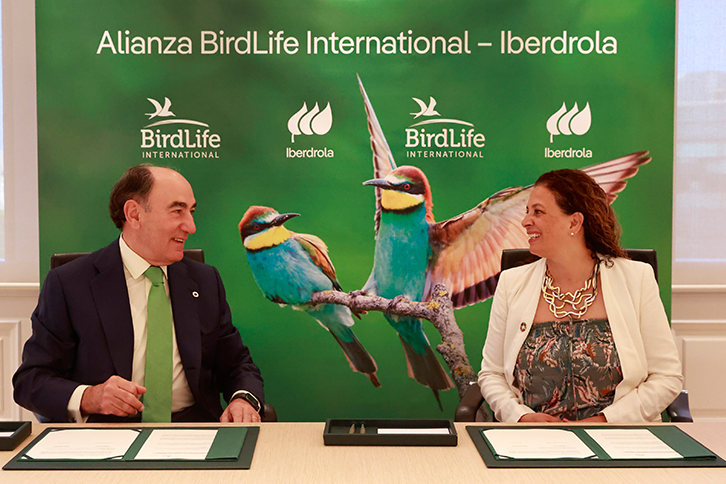News
2023-06-14 10:30:00.0Iberdrola and Birdlife International sign alliance to protect biodiversity
- The two organisations share the view that a sustainable energy system based on renewables is essential to address the interrelated crisis of climate change and biodiversity loss and will work together towards renewable deployment that enhances the contribution to biodiversity.
- The Executive Chairman of Iberdrola, Ignacio Galán, said: "Building ties between different social stakeholders is essential to provide an urgent response to the planet's main challenges, such as the fight against climate change and the loss of biodiversity. At Iberdrola, we have been developing clean and sustainable energy for decades and by 2030 we will reach carbon neutrality for our electricity generation, and we will have a net positive impact on biodiversity"
- BirdLife’s CEO, Patricia Zurita said “It is terrific to work with Iberdrola to strengthen their strategies and implementation of renewable deployments that address both the climate crisis and its twin the biodiversity crisis. To fight climate change we must also protect and restore nature. Business partners such as Iberdrola are a key component of a multifaceted approach involving conservationists, governments, finance, and business.”
The Executive Chairman of Iberdrola, Ignacio Galán, and the CEO of Birdlife International, Patricia Zurita signed this morning in Madrid a three-year strategic alliance to work together towards renewable deployment that enhances the contribution to biodiversity.
The two organisations share the view that a sustainable energy system based on renewables is essential to address the interrelated crisis of climate change and biodiversity loss. If this renewable deployment is properly located and managed, it can meet clean energy needs, be positive to climate and, at the same time, contribute to healthy ecosystems. With this purpose, the alliance will bring together the efforts of Iberdrola and Birdlife International in advancing renewable solutions that provide enhanced and long-term benefits to biodiversity, through the promotion and implementation of enabling policies, joint projects, research, science-based best practices, and communication.
"Building ties between different social stakeholders is essential to provide an urgent response to the planet's main challenges, such as the fight against climate change and the loss of biodiversity. At Iberdrola, we have been developing clean and sustainable energies for decades, and by 2030 we will reach carbon neutrality for our electricity generation, and we will have a net positive impact on biodiversity," said Ignacio Galán.
Patricia Zurita said “It is terrific to work with Iberdrola to strengthen their strategies and implementation of renewable deployments that address both the climate crisis and its twin the biodiversity crisis. To fight climate change we must also protect and restore nature. Business partners such as Iberdrola are a key component of a multifaceted approach involving conservationists, governments, finance, and business.”
The agreement signed today will help identify areas of strategic convergence and expand the existing collaboration between the two organisations through Birdlife International's many national members.
Commitment to environmental protection
Multidisciplinary groups of experts from both organisations will work together to seek opportunities for projects, research, communicate new knowledge and promote best practice. This work will be structured along the following lines of action:
- Policy: supporting ambitious approaches to climate and biodiversity policy and setting the standard for industry to deliver international best practice.
- Nature-positive energy: drive industry progress in understanding and implementing nature-positive solutions as standard practice in the deployment of renewable energy.
- Nature-based solutions: establish an industry-leading position to address climate and biodiversity crises through the delivery of high integrity nature-based solutions with multiple socio-economic and biodiversity benefits.
- Knowledge exchange and communication, including dissemination of best practices, methodologies, new research, and any other relevant information on positive actions for nature in the energy sector, encouraging their adoption by other stakeholders.







